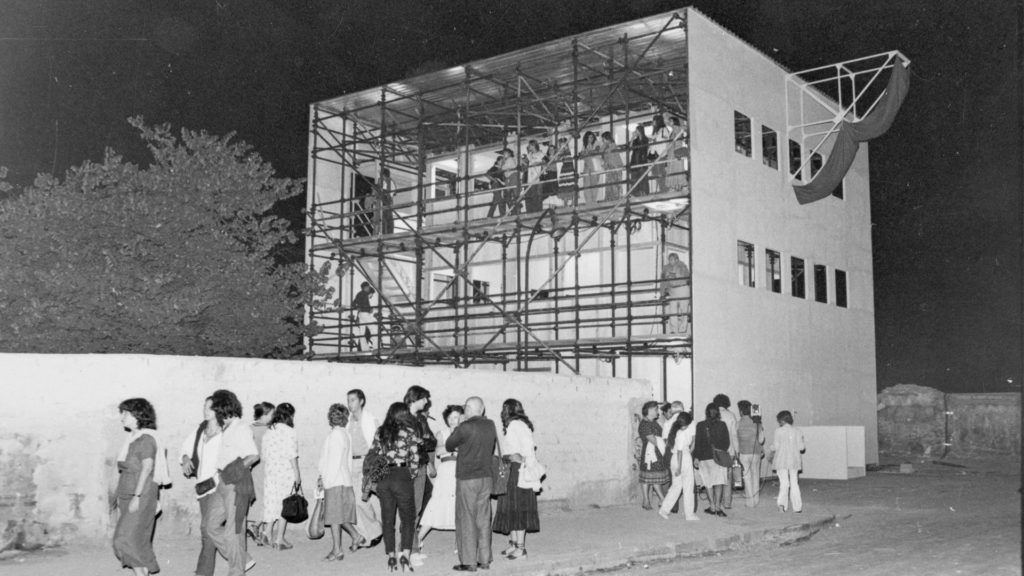event
Thursday 21 September 2017 7.00 PM - 8.30 PM
– for young people aged between 18 and 25 (not yet turned 25);
– for groups of 15 people or more;
– La Galleria Nazionale, Museo Ebraico di Roma ticket holders;
– upon presentation of ID card or badge: Accademia Costume & Moda, Accademia Fotografica, Biblioteche di Roma, Centro Sperimentale di Cinematografia, Enel (for badge holder and accompanying person), FAI Fondo Ambiente Italiano, Feltrinelli, Gruppo FS, IN/ARCH Istituto Nazionale di Architettura, Sapienza Università di Roma, LAZIOcrea, Palazzo delle Esposizioni, Amici di Palazzo Strozzi, Accademia Nazionale di Santa Cecilia, Scuola Internazionale di Comics, Teatro Olimpico, Teatro dell’Opera di Roma, Teatro di Roma, Università degli Studi di Roma Tor Vergata, Youthcard;
– upon presenting at the ticket office a Trenitalia ticket to Rome purchased between 27 November 2024 and 21 April 2025
valid for one year from the date of purchase
– minors under 18 years of age;
– myMAXXI cardholders;
– on your birthday presenting an identity document;
– upon presentation of EU Disability Card holders and or accompanying letter from hosting association/institution for: people with disabilities and accompanying person, people on the autistic spectrum and accompanying person, deaf people, people with cognitive disabilities and complex communication needs and their caregivers, people with serious illnesses and their caregivers, guests of first aid and anti-violence centres and accompanying operators, residents of therapeutic communities and accompanying operators;
– MiC employees;
– journalists who can prove their business activity;
– European Union tour guides and tour guides, licensed (ref. Circular n.20/2016 DG-Museums);
– 1 teacher for every 10 students;
– AMACI members;
– CIMAM International Committee for Museums and Collections of Modern Art members;
– ICOM members;
– from Tuesday to Friday (excluding holidays) European Union students and university researchers in art history and architecture, public fine arts academies (AFAM registered) students and Temple University Rome Campus students;
– IED Istituto Europeo di Design professors, NABA Nuova Accademia di Belle Arti professors, RUFA Rome University of Fine Arts professors;
– upon presentation of ID card or badge: Collezione Peggy Guggenheim a Venezia, Castello di Rivoli Museo d’Arte Contemporanea, Sotheby’s Preferred, MEP – Maison Européenne de la Photographie;
for groups of 12 people in the same tour; myMAXXI membership card-holders; registered journalists with valid ID
under 14 years of age
disabled people + possible accompanying person; minors under 3 years of age (ticket not required)
MAXXI’s Collection of Art and Architecture represents the founding element of the museum and defines its identity. Since October 2015, it has been on display with different arrangements of works.

27 Apr 2025 05.00 pm
CreAzioneLifeby Anton Corbijn
30 Apr 2025 07.30 pm
music performanceOkkyung Lee & Rashad Becker
6 May 2025 06.00 pm
books at MAXXINero indelebileby Mirella Serri
7 May 2025 06.00 pm
talkItalia Amore Mioby Gianfranco Jannuzzo
11 May 2025 12.00 pm
guided toursStop DrawingArchitecture beyond Representation
14 May 2025 06.00 pm
books at MAXXIPaleoestetica. Alle origini della cultura visualeby Michele Cometa
Graziella Lonardi Buontempo Hall – admittance free subject to availability of places
myMAXXI cardholders may reserve places by writing to mymaxxi@fondazionemaxxi.it, by the day before the event (10 places available)
The season of the ephemeral, cultural engagement and participatory art
The Estate Romana era was part of a phase in which the arts globally redefined the relationships with the museums, the urban space and the social fabric. From Rome to Florence, from the Paris of Jack Lang to the Los Angeles of Rucha, artists and architects were choosing the street and the landscape as the setting of choice for their battles. The ideological, creative and design equipment changed in relation to this new condition and redefined the role of architects and artists.
Focusing attention on the legacy of the “urban wonder” the meeting represents an opportunity to present and discuss three publications in particular: Estate Romana. Tempi e pratiche della città effimera by Federica Fava, a work by Léa-Catherine Szacka entitled Exhibiting the Postmodern: The 1980 Venice Architecture Biennale which examines the crucial contribution made by the first architecture biennale to the culture of the ephemeral and, in conclusion, Arte a Firenze 1970 – 2015. Una città in prospettiva by Alessandra Acocella and Caterina Toschi.
Introduced by
Pippo Ciorra Senior Curator MAXXI Architettura
Speakers
Alessandra Acocella Associazione Culturale Senza Cornice
Federica Fava architectural historian
Léa-Catherine Szacka architect
Caterina Toschi Associazione Culturale Senza Cornice
Moderated by
Luigia Lonardelli curator MAXXI